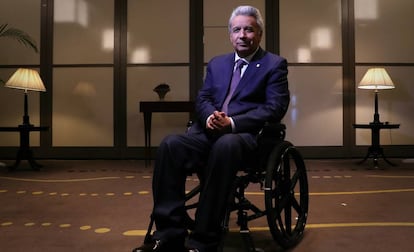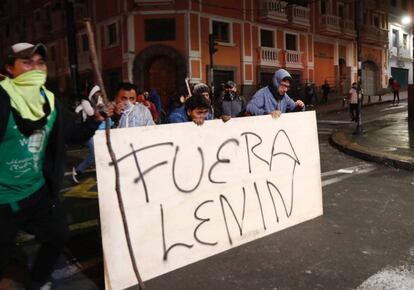“The so-called socialists of the 21st century have plundered Latin America”
Lenín Moreno talks to EL PAÍS about the recent unrest in Ecuador, which he believes was partly instigated by his predecessor Rafael Correa


Two months after Ecuador was hit by widespread protests, sparked in part over the decision to remove state fuel subsidies, Ecuadorian President Lenín Moreno was in Madrid for the United Nations Climate Change Summit COP25. The 66-year-old head of state met with Spain’s caretaker Prime Minister Pedro Sánchez, and with King Felipe VI.
Moreno maintains that the situation in Ecuador is now calm, and accuses his predecessor, Rafael Correa, also from the Alianza País party, of instigating the disturbances.
Question. What is the situation in Ecuador like now?
The indigenous protests were infiltrated by criminal groups
Answer. It’s completely calm. We have held dialogue with different social sectors, and have reached agreements on many issues with them, including the possibility of focusing the [removal] of the fuel subsidy so that it affects the less wealthy as little as possible.
Q. Have you begun negotiating with the indigenous communities?
A. With some, yes. There is a sector that has refused to take part in the dialogue we have begun, and which was agreed to by the guarantors at the time – the Ecuadorian Episcopal Conference and the United Nations. But we are talking to the rest. They have presented a proposal that we will review in due time.

Q. What exactly happened in October? What is your version?
A. Traditionally, the indigenous people have protested against measures that they don’t think will benefit them, and generally, they have done so peacefully, and they did so last time. What happened is that they were infiltrated by criminal groups, paid by supporters of [former Ecuadorian president] Rafael Correa, as well as people from the FARC [Revolutionary Armed Forces of Colombia] and the ELN [National Liberation Army from Colombia], and people on the payroll of [Venezuelan president Nicolás] Maduro, who camouflaged themselves among the nearly 4,000 Venezuelans who have come to the country as migrants and criminal gang members. They began to commit unprecedented acts of violence against the police and the people, destroying shops. They did something that was very significant – they burned the national auditor's office and the department which had found evidence of corruption by the Correa government, which we imagine was their ultimate goal.
Q. Do you have proof?
A. Investigations are underway into many people closely linked with the Correa government. Don’t forget that the investigation into the corruption of the Correa government is the final judicial stages, and that makes them very worried. That’s why they are taking advantage of the indigenous protests, which – when they are not violent – are recognized as a constitutional right. It is very easy to link the heads [of the protests] and reach a conclusion about why the protests happened.
I am a socialist, but a real one
Q. But there is no physical proof of this conspiracy…
A. The public prosecutor has it. Raids were conducted on the orders of the public prosecution – not the executive – as well as telephone taps, and they are finding evidence for conviction.
Q. The protests in Ecuador opened the floodgates to a wave of protests across South America. In Chile, this has led to constitutional change, and in Bolivia, to the ousting of former president Evo Morales…
A. It’s too much of a coincidence, don’t you think?
Q. Do you believe it is all part of the same plan?
A. It’s all been premeditated.
Q. Conspiracy aside, it appears there were objective conditions for the discontent in the continent…
A. Inequality is quite high, in Ecuador as well. It is the government’s job to try to reduce the gap between the most disadvantaged and the wealthiest. In Ecuador, we are trying to end inequality with programs like Toda Una Vida [All of One Life], which as it names indicates, starts from the moment of conception to the moment God decides to shut our eyes.
It is the government’s job to reduce the gap between the most disadvantaged and the wealthiest
Q. Was there a coup in Bolivia?
A. Who staged the coup? Someone who staged dirty elections or the people who came out to protest against it? You would have to look at who staged the coup. [...] The interim president, Jeanine Áñez, has called for transparent and clean elections, with broad controls and international observers. I don’t think there can be a greater display of democracy than that.
Q. In February, your government incurred a large debt with the International Monetary Fund (IMF) and it needs another $500 million (€451 million) in the short term…
A. It is part of a financing deal that exceeds $10 billion [€9 billion] and it is not just with the IMF, it is also with the World Bank, the Inter-American Development Bank, the European Investment Bank, the French Investment Agency. In other words, a group of international organizations has decided to support Ecuador’s development because the debt that the former government incurred is costly and difficult to pay back in the short term. In contrast, the debt with these institutions is long term and easy to pay, with low interest rates.
Q. Are you considering calling new elections if your tax reforms are not approved for the second time?
A. No. With the exception of Correa supporters, no one else has called for it.
Q. Do you believe an indigenous leader will be the next president of Ecuador in 2021?
A. The people will decide that, but I guarantee you that they will find a country in much better conditions than those that we inherited.
Q. A few recent surveys put your disapproval rate at 80% …
A. If that were true, I would be at home, having fun with my grandchildren. There is massive international propaganda. The gang of the so-called socialists of the 21st century have raided the resources of Latin America. Now, these resources are being invested in foundations that finance political parties. I don’t want to refer to any specific country because I am in Spain, and social organizations and intellectuals from the left are very comfortable with this ideological and economic position. Money tends to buy everything except dignity. I am a socialist, but a real one. A gang has appropriated the term socialism to plunder countries.
Q. You used to be Correa’s second-in-command, and now you are enemies…
A. Yes. I am still purging him out. Do you want me to say mea culpa? I took no interest in working out whether what the former president said with a lot of conviction was true. No corrupt person has this fact written on their forehead.
English version by Melissa Kitson.
Tu suscripción se está usando en otro dispositivo
¿Quieres añadir otro usuario a tu suscripción?
Si continúas leyendo en este dispositivo, no se podrá leer en el otro.
FlechaTu suscripción se está usando en otro dispositivo y solo puedes acceder a EL PAÍS desde un dispositivo a la vez.
Si quieres compartir tu cuenta, cambia tu suscripción a la modalidad Premium, así podrás añadir otro usuario. Cada uno accederá con su propia cuenta de email, lo que os permitirá personalizar vuestra experiencia en EL PAÍS.
¿Tienes una suscripción de empresa? Accede aquí para contratar más cuentas.
En el caso de no saber quién está usando tu cuenta, te recomendamos cambiar tu contraseña aquí.
Si decides continuar compartiendo tu cuenta, este mensaje se mostrará en tu dispositivo y en el de la otra persona que está usando tu cuenta de forma indefinida, afectando a tu experiencia de lectura. Puedes consultar aquí los términos y condiciones de la suscripción digital.








































